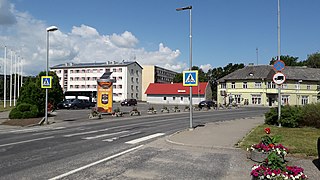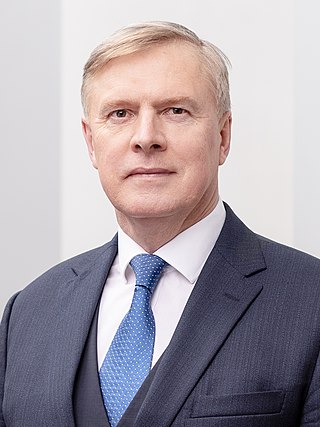Politics in Estonia takes place in a framework of a parliamentary representative democratic republic, whereby the Prime Minister of Estonia is the head of government, and of a multi-party system. Legislative power is vested in the Estonian parliament. Executive power is exercised by the government, which is led by the prime minister. The judiciary is independent of the executive and the legislature. Estonia is a member of the United Nations, the European Union, and NATO.
The Republic of Estonia gained its independence from the Russian Empire on 24 February 1918 and established diplomatic relations with many countries via membership of the League of Nations. The forcible incorporation of Estonia into the Soviet Union in 1940 was not generally recognised by the international community and the Estonian diplomatic service continued to operate in some countries. Following the restoration of independence from the Soviet Union, Russia was one of the first nations to re-recognize Estonia's independence. Estonia's immediate priority after regaining its independence was the withdrawal of Russian forces from Estonian territory. In August 1994, this was completed. However, relations with Moscow have remained strained primarily because Russia decided not to ratify the border treaty it had signed with Estonia in 1999.

Tapa is a town in Tapa Parish, Lääne-Viru County, Estonia, located at the junction of the country's Tallinn–Narva (west–east) and Tallinn–Tartu–Valga (north–south) railway lines. Tapa has the Estonian Defense Forces nearby Keskpolügoon. The Valgejõgi River passes Tapa on its northeastern side. Tapa has been known as both a railway and a military town throughout its history.

Mart Laar is an Estonian politician and historian. He served as the Prime Minister of Estonia from 1992 to 1994 and from 1999 to 2002. Laar is credited with having helped bring about Estonia's rapid economic development during the 1990s. He is a member of the centre-right Isamaa party.

The Minister of Foreign Affairs is the senior minister at the Ministry of Foreign Affairs in the Estonian Government. The Minister is one of the most important members of the Estonian government, with responsibility for the relations between Estonia and foreign states.

The Estonian Navy are the unified naval forces among the Estonian Defence Forces.
The Estonian resistance movement was an underground movement to resist the occupation of Estonia by Nazi Germany, 1941–1944 during World War II. Due to the unusually benign measures implemented in Estonia by the German occupation authorities, especially in contrast to the preceding harsh Soviet occupation of Estonia (1940–1941), the movement was slower to develop effective tactics on a wide scale than in other occupied countries.

The Estonian Air Force is the aviation branch of the Estonian Defence Forces. The air force traces its history to 1918, and was re-established in its current form in 1991.

The Estonian Defence League is a voluntary national defence organization of the Republic of Estonia, under management of the Ministry of Defence. Its aim is to guarantee the preservation of the independence and sovereignty of the state, the integrity of its land area and its constitutional order.

Leo Kunnas is an Estonian former military officer and a science fiction writer.

The Estonian Police was the law enforcement agency of Estonia. It was subordinate to the Ministry of the Interior. In 2010, the organization was superseded by the Police and Border Guard Board.

The Ministry of Defence of the Republic of Estonia and its head, the Minister of Defence, are responsible for organizing national defence. It is Estonia's ministry of defence. The mission of the Ministry of Defence is to deter attacks against Estonia and ensure that the country is capable of defending itself against external threats. Estonian national defence is based on initial self-defence capability as well as membership in NATO.

The Estonian Border Guard was the national security agency responsible for the border security of Estonia. It was subordinate to the Ministry of the Interior. The Border Guard also assisted with Search and Rescue missions. In 2010, the organization was superseded by the Police and Border Guard Board.

The Estonian Defence Forces is the unified military force of the Republic of Estonia. The Estonian Defence Forces consists of the Estonian Land Forces, the Estonian Navy, the Estonian Air Force, and the paramilitary Estonian Defence League. The national defence policy aims to guarantee the preservation of the independence and sovereignty of the state and maintain the integrity of its land area, territorial waters, airspace, and constitutional order. Its main goals remain the development and maintenance of a credible capability to defend the nation's vital interests and of the defence forces in a way that ensures their interoperability with the armed forces of NATO and European Union member states in order to participate in the full range of missions for these military alliances.

Urmas Reinsalu is an Estonian politician who served as Minister of Foreign Affairs from 2022 to 2023 and previously from 2019 to 2021. Before that, Urmas has served as the Minister of Defence between 2012 and 2014, and Minister of Justice from 2015 to 2019. Reinsalu is a member and current leader of the Isamaa ("Fatherland") political party, and was the party leader from 2012 to 2015.

Margus Tsahkna is an Estonian politician, leader of new liberal Estonia 200 party since 19 November 2023, former leader of the conservative Isamaa party, former Minister of Defence in Jüri Ratas' cabinet and Minister of Social Protection in Taavi Rõivas' second cabinet. He was sworn in as Minister of Foreign Affairs in the third cabinet of Kaja Kallas on 17 April 2023.

The Kaitseväe orkester, known in Anglophone countries as the Band of the Estonian Defence Forces, is the official military band service of the Estonian Defence Forces. The main task of the band is to play music at all national and military ceremonies. The band's repertoire includes mostly classical and marching music. It is currently made up of 40 musicians. From 1996 to 2019, the conductor of the band was Lieutenant Colonel Peeter Saan. Each year, the band takes part in about 220 concerts, festivals, and ceremonial parades of the Defence Forces. It has also performed at venues abroad in countries like Lithuania, France and Germany. Traditionally, the band holds Autumn and Spring concerts in the Estonia Concert Hall.

Kalle Laanet is Estonian politician and police officer. He is member of XIV Riigikogu. Since 2014 he belongs to Estonian Reform Party. He served as Minister of Justice from April 2023 to April 2024 in the third cabinet of Prime Minister Kaja Kallas.

















